by Virgie Mueller
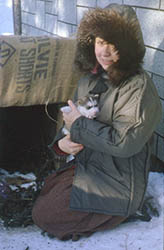 “I’D LIKE TO CALL THE AIRLINES to book a flight to Paint Hills,” I told the man as I stepped toward a dingy counter in the Moosonee, Ontario train station. He pushed a square black telephone toward me without saying a word.
“I’D LIKE TO CALL THE AIRLINES to book a flight to Paint Hills,” I told the man as I stepped toward a dingy counter in the Moosonee, Ontario train station. He pushed a square black telephone toward me without saying a word.
The one-room train depot was empty now except for me and my two year-old son, Steven. The voice at the other end of the line said, “Tell us where you’re staying and we’ll pick you up in time for the next flight up the coast.”
“But I don’t know where I’ll be staying,” I replied. “Just tell me when the next flight is and I’ll come there,” I tried to explain.
“Well, ma’am, there was a flight yesterday, but with this weather settling in, it could be a week before we have another.”
I felt a big lump forming in my throat. What should I do? Where should I go? Why hadn’t Russell (my husband) told me what to do when I arrived here at the end of the rail line?
STEVE AND I HAD TRAVELED BY TRAIN for three days from Enid, Oklahoma to Moosonee. The last 200 miles beyond the road was remote wilderness of stunted spruce, muskeg, and bush. The “Polar Bear Express” was the sole means of transportation, and stopped at frequent intervals to let people off and others onto the train.
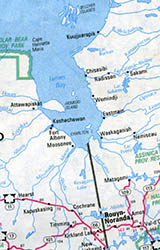 Now there wasn’t sight of a town anywhere. There wasn’t even a house, trail or anything that resembled a place for a train to stop. There had been only the depot stating it was Moosonee. The community, apparently, was buried away in the bush. And it was now another 200 miles by float plane up the coast of James Bay before I’d be at Paint Hills, Quebec (now called Wemindji).
Now there wasn’t sight of a town anywhere. There wasn’t even a house, trail or anything that resembled a place for a train to stop. There had been only the depot stating it was Moosonee. The community, apparently, was buried away in the bush. And it was now another 200 miles by float plane up the coast of James Bay before I’d be at Paint Hills, Quebec (now called Wemindji).
“May I leave these boxes here for the time being?” I gulped. “Sure, no one will bother them,” the station agent replied, trying to be cheerful as he saw the tears glistening in my eyes.
Stepping out onto the platform between the station and the rails, all I could see was a muddy path leading into the heavy bush. Taking my son by the hand we started walking down the trail.
It was September, 1962. The weather was overcast with a light rain falling. As I walked, the tears ran down my cheeks. No one, absolutely no one, knew where I was.
Six weeks earlier Russ Mueller and two other missionary men had traveled to James Bay where NCEM was planning to open two new mission stations, in addition to the existing three. The Muellers’ house at Paint Hills was being built with used lumber from an old Hudson’s Bay Company store, five hours away by boat.
Russ & Virgie settled into life in Paint Hills, where they would serve for six years. After telling of their many cross-cultural adjustments, ministry setbacks and advances there, Virgie continues …
MINISTRY AT PAINT HILLS HAD OCCUPIED the majority of our prayers and thoughts. Rightly so. When we moved from there to Thicket Portage (MB), we were presented with another community, but we couldn’t forget where we’d been. The third station of Cumberland House (SK) again required the majority of our prayers and thoughts, but the windows of our hearts were opening wider with each move.
No longer did we see just the small community we were living in, but we saw the work as a whole. We were really just a little spoke in God’s wheel.
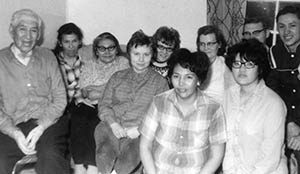
Bible study group at Thicket Portage, Manitoba.
When Russell was appointed to serve on the NCEM Eastern-Field Council, the world suddenly sprang open to expose a much bigger picture: a variety of fields, people and so many spiritual needs.
On one survey and member care trip, three Eastern Council men flew to Rupert House (Waskaganish, QC) from The Pas (MB). It was a 1000-mile one-way trip with the Mission’s Cessna 180 over lakes and muskeg. They planned to stay the night, and tied the plane down as secure as possible along the shore of the Rupert River before heading for supper.
However, during supper they saw dark clouds coming from the west. A big wind came up and the trees began to sway. Water began to stir and waves began forming on the water. Ed Hickey (the pilot) and Russ started running to the plane, thinking perhaps if they got into the plane their added weight would help hold it in down.
The wind was so strong they had to seek shelter behind some buildings. Afterwards the men realized how foolish to have thought their weight would hold the plane down on the water. The plane was lifted up like a paper box. It appeared to be flying 15 feet above the water but wasn’t moving because the tail was tied with a strong nylon rope attached to a heavy chain anchored near the shore. The plane then made a nose dive right into the river.
Within minutes all was calm, leaving behind destruction to tents, a school and a warehouse that were completely destroyed. Ed and Russ, along with some local men who had seen the wind pick up the plane and throw it into the river, were able to right the plane back onto its floats by pulling the rope anchoring the tail toward shore. It took more than 20 men to lift the entire plane and carry it up further onto shore to get it up above the tide level. Russ and Cliff McComb went on to visit the other stations by commercial airways.
Russ enjoyed traveling with the other Council members in the Cessna. He was so blessed and encouraged to meet Native believers and see the Native churches that had sprung up during the past decades.
On one such trip he attended the dedication of the church at Weagamow, Ontario. When they visited the Native churches all the missionaries were asked to give a message. The people didn’t seem to mind sitting for a three-hour service. They just felt so blessed to have the visitors share from the Word of God.
FOLLOWING MINISTRY AT CUMBERLAND HOUSE, the Muellers were asked to move to Lac La Biche (AB), where NCEM had begun a Bible school. Virgie describes life on the Key-Way-Tin campus, including this insight ..:
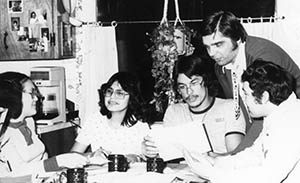
Russ with Key-Way-Tin Bible Institute students
Although KBI staff and students scattered for various ministries on Sunday mornings, our Sunday evening services were held on campus. Every second week was “Sharing Night.” Nothing was planned, and the evening was open for volunteer special music or sharing of testimonies.
In the boys dorm guitars had been passed around with almost everyone learning to play. Most students took a turn at singing and playing songs or testifying. Students were learning to get up before a group to talk and sing, and that strengthened their faith.
Wednesday evenings we had a short Bible study and shared prayer requests. The remainder of the evening we divided into small groups and prayed for pertinent prayer requests.
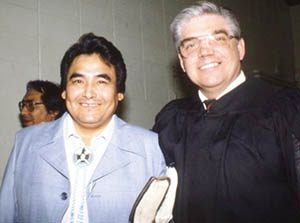
Russ with evangelist Fred Evans, a “cause for concern” back in Thicket Portage days.
One evening a student stood up and said, “Pray for my wife as she is backslidden.” She was sitting there beside him! It wasn’t long before she was restored to fellowship with the Lord. We learned that the Native believers were more open to share their prayer requests or acknowledge their spiritual struggles than we non-Natives were.
In 1982 there were 49 students at KBI. The following year the School reached its peak enrollment of 52. Soon Russell was asked to become the School principal. Serving at Key-Way-Tin, the Muellers felt privileged to have this connection with First Nations students from across Canada, and they especially rejoiced to see those from their former stations enrolling.
THERE WERE TWO STUDENTS who had come from our former station of Thicket Portage, and four or more who had come from Cumberland House during our time at KBI. In fact, a KBI graduate went to Cumberland House to pastor the little church there where we had ministered. Others came from villages we had visited, like Moose Factory.
At times students would stop by the office with problems. Russ asked if they had prayed about the problem. Most of the time they said they had not prayed about it. Russ told them that they needed to take their problems to the Lord in prayer first, and struggle through it in prayer. Then, if the problem persisted, he would be willing to discuss it with them two days later.
We were trying to teach them that we would not always be around to solve their problems, but the Lord would always be available. Usually the students found God had answered their prayers and they didn’t need to discuss it anymore!
KBI graduates went on to attain great things. We tell people that it is what the Lord has done in their lives. That’s the answer to problems all youth face, regardless of their culture or upbringing.
The Muellers’ years at KBI were followed with pastoral ministry in Yellowknife (NWT) and Spruce Grove (AB). They continued as associate NCEM members, with Russ teaching part-time at KBI, and were made honorary members in 2007. Virgie concludes her written recollections of their ministry with this …
RECENTLY WHEN WE WERE GOING TO THE USA for a visit, we handed our Canadian passports to the USA border agent. He could see we were born in the USA, but now claimed citizenship in Canada.
His question to us was, “Why did you leave us?” Russell said, “Do you want the long version or the short version? The short version is: we left our homeland to come share Jesus Christ with the Aboriginal people of Canada.”
The long version meant going to a place where the Gospel had never been presented, to those lost in sin. We went to children to teach them the way to God before they started down the road to destruction.
The highlight of our 30 years in Native ministry has been to teach Native believers to stand fast in the Lord and go out and preach the Gospel to their own people. They are able to reach more Native people than we ever could.

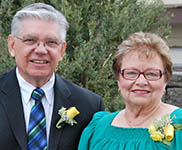 Russ & Virgie Mueller are honorary NCEM members, residing in Spruce Grove, Alberta. They have three married children.
Russ & Virgie Mueller are honorary NCEM members, residing in Spruce Grove, Alberta. They have three married children.
These excerpts are adapted from “A Southern Belle Goes North” by Virgie Mueller ©2014. The 310-page book tells of the Muellers’ many cross-cultural and ministry experiences in Paint Hills, and subsequent locations. It is available for purchase. To order please phone our Bookstore at 306-764-4490.
(from Northern Lights issue #531). Note: some of the locations and involvements of our missionaries may have changed since the original publishing of this article.

